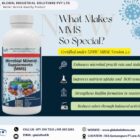Water is essential for life, but not all water is safe to use. Treating water ensures it’s clean and safe for drinking, cooking, and industrial use. Both households and industries rely on proper water treatment to protect health, the environment, and the systems they use.
Importance of Clean Water for Health and Environment
Clean water is crucial for preventing diseases. Contaminated drinking water can carry bacteria, viruses, and chemicals that cause illnesses like diarrhea, cholera, and hepatitis. In industries, untreated water or poorly managed wastewater can harm ecosystems. Pollutants from factories such as chemicals, heavy metals, and organic waste can contaminate rivers, lakes, and groundwater, affecting both wildlife and communities downstream.
Proper treatment ensures that water is safe to consume, reduces the risk of pollution, and supports sustainable use of this vital resource.
Common Contaminants in Water
Water can be contaminated in different ways depending on its source:
1. Drinking Water Contaminants
-
Biological: Bacteria, viruses, and parasites from sewage or surface water
-
Chemical: Pesticides, heavy metals (like lead and arsenic), and industrial chemicals
-
Physical: Sediments, dirt, and rust that make water cloudy
-
Radiological: Naturally occurring radioactive materials in some regions
2. Industrial Wastewater Contaminants
-
Organic pollutants: Food, dairy, textile, and paper processing waste
-
Inorganic pollutants: Heavy metals, acids, and salts from manufacturing processes
-
Pathogens: Microorganisms that can survive in untreated waste streams
-
Nutrients: Excess nitrogen and phosphorus from industrial runoff, which can cause water pollution and algal blooms
Treating both drinking water and industrial wastewater ensures that harmful substances are removed before the water is reused or released into the environment. Clean water is not just a necessity for daily life – it’s also key to protecting ecosystems, supporting industries, and maintaining public health.







